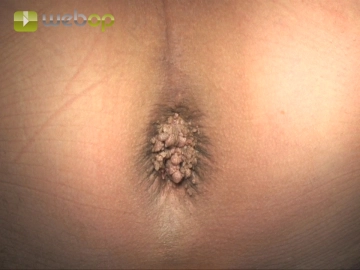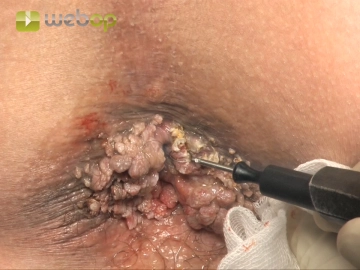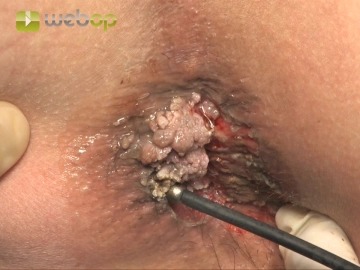Expose the lesions and confirm diagnosis by sending specimen for histopathology. The easiest way to do this is through excision with scissors. All suspected malignant lesions must be studied separately.
-
Assessment of finding; specimen for histopathology
-
Snare excision
![Snare excision]()
Soundsettings The video clip can be played back with the automatic soundtrack of the subtitles.
In the sidebar registered users can enable and disable the automatic start of the dubbing.
Remark: Since this is a text-to-speech computer voice, it may mispronounce some medical terminology.Remove all lesions as small as possible and always in completely superficial epicutaneous fashion. Here, too, the wet-resection technique can be recommended, as it improves the conduction of the current and better protects the environment through cooling. The excision must not involve the entire skin. This is unnecessary, since without exception the location of each lesion is epicutaneous. If a lesion extends more deeply, infiltrative growth may be present, in which case a more extensive and deeper excision becomes necessary (see AIN and anal cancer).
-
Contact destruction with ball-tipped diathermy
![Contact destruction with ball-tipped diathermy]()
Soundsettings The video clip can be played back with the automatic soundtrack of the subtitles.
In the sidebar registered users can enable and disable the automatic start of the dubbing.
Remark: Since this is a text-to-speech computer voice, it may mispronounce some medical terminology.Once again with wet-resection technique destroy each lesion with electric current and then completely remove with a swab or sharp spoon.
Here proceed in the same way as perianally. It is quite typical that the lesions will extend into t
Activate now and continue learning straight away.
Single Access
Activation of this course for 3 days.
Most popular offer
webop - Savings Flex
Combine our learning modules flexibly and save up to 50%.
US$87.34/ yearly payment
general and visceral surgery
Unlock all courses in this module.
US$174.70 / yearly payment



